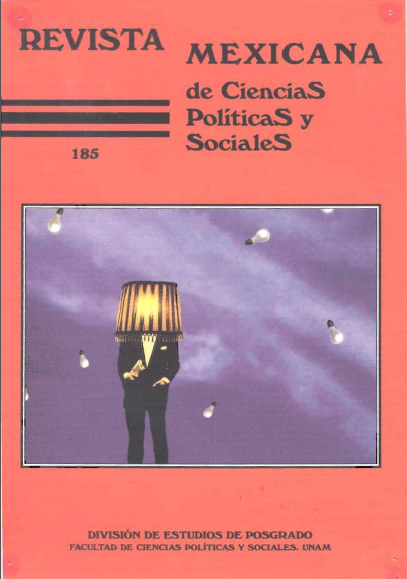Hackers: de piratas a defensores del software libre
Main Article Content
Abstract
Downloads
Article Details
Citas en Dimensions Service
References
Barlow, John Perry, The Economy of Ideas, 1993, en http://www.ram.org/ramblings/philosophy/fmp/economy_of_ideas.html.
Bey, Hakim, (T.A.Z. the Temporary Autonomous Zone, Ontological Anarchy, Poetic Terrorism, Nueva York, Autonomedia, 1994.
Castells, Manuel, La era de la información, vol. 1, México, Siglo XXI, 1999.
Charles, Plat, Anarchy Online, Nueva York, Harper Prism, 1996.
Clough, Bryan y Paul Mungo, Los piratas del chip, Madrid, Ediciones B, 1992.
Gibson, William, El Neuromante, Barcelona, Minotauro, 1989.
Hafner, Katie y John Markoff, Cyberpunk : Outlaws and Hackers on the Computer Frontier, Nueva York, Simon & Schuster, 1991.
Hernández, Claudio, Hacking en internet, 1998, Ciberlibro, en http://www.echonyc.com/~steven/hackers.html.
Hernández, Claudio, Hackers piratas tecnológicos, Madrid, Coelma, 1998.
Hernández, Claudio, Hackers Los clanes de la red, Ciberlibro, 2000, en http://www.echonyc.com/~steven/hackers.html.
Klander, Lars, A Prueba de hackers, Madrid, Anaya Multimedia, 1998.
Knightmare, Secrets of a Super Hacker Loompanics Unlimited, 1994.
Kroker, Arthur y Marimouise Kroker, Hacking the Future, Canadá, New World Perspective, 1996.
L@cybercuev@, Crimen y castigo en el ciberespacio, Ciberlibro, 1999, en http://rene1.cjb.net.
Levy, Pierre, La inteligencia colectiva, 1994.
Levy, Pierre, El anillo de oro, 2000, en http://www.sindominio.net/biblioweb/telematica.
Levy, Pierre, “L’Intelligence Collective”, Le Monde Diplomatique, octubre de 1995.
Levy, Steven, Hackers: Heroes of the Computer Revolution, Nueva York, Penguin-USA, edición revisada, 2001.
Meyer, Gordon, The Social Organization of the Computer Underground, Unpublished Master’s Thesis, University of Northern Illinois, 1989.
Raymond, Eric (comp.) The Hacker’s Dictionary, USA The MIT Press, 1999. La versión electrónica “Jargon File Resources” está disponible en http://www.ccit.orgliargonl/.
Roberti, Raquel y Fernando Bonsembiante, Llaneros solitarios, hackers, la guerrilla informática, Madrid, Colección Fin de Siglo, 1996.
El Universal, “e-México, uno de los mayores retos del gobierno”, 4 de febrero de 2002, computación, p 1.
Shimomura, Tsutomu, Takedown, Buenos Aires, El País Aguilar, 1997.
Sterling, Bruce, The Hacker Crackdown. Law and Disorder on the Electronic Frontier, Nueva York-Toronto-Londres-Sydney-Auckland, Bantam Books, 1992.
McClure, Stuart, Joel Scrambray y George Kurtz, Hackers: secretos y soluciones para la seguridad de redes, Madrid, Osborne-McGrawHill, 2000.
Villate, Javier, “Mitos de internet: las aguas profundas y las islas perdidas de la web”, en Enredando, 2001, en http://www.enredando.com/cas/cgi-bin/enredantes/plantilla.pl?ident=155.
The Jargon File, en http://www.tuxedo.org/~esr/jargon/jargon.html; “Qué es el software”, en http://www.sindominio.net/biblioweb/telematica/softlibre.

La Revista Mexicana de Ciencias Políticas y Sociales publicada por la Universidad Nacional Autónoma de México se distribuye bajo una Licencia Creative Commons Atribución-NoComercial-SinDerivar 4.0 Internacional.
Basada en una obra en http://www.revistas.unam.mx/index.php/rmcpys/
La RMCPyS autoriza a sus colaboradores que suban una copia de sus trabajos publicados en sus webs personales o en cualquier repositorio de acceso abierto, siempre y cuando se mencione específicamente a la Revista Mexicana de Ciencias Políticas y Sociales como fuente original de procedencia, citando el año y número del ejemplar respectivo y añadiendo el enlace a la página web donde este órgano editorial puede ser consultado in toto, de manera abierta y gratuita en: <www.revistas.unam.mx/index.php/rmcpys>.
Las y los lectores tienen libertad para:
Compartir, copiar y redistribuir el material en cualquier medio o formato.
El licenciante no puede revocar estas libertades en tanto usted siga los términos de la licencia.
De acuerdo con los siguientes términos:
- Atribución: la/el lector/a debe reconocer el crédito de una obra de manera adecuada, proporcionar un enlace a la licencia, e indicar si se han realizado cambios. Puede hacerlo en cualquier forma razonable, pero no de forma tal que sugiera que tiene el apoyo del licenciante o lo recibe por el uso que hace.
- No comercial: la/el lector/a no puede hacer uso del material con fines comerciales.
- Si se mezcla, transforma o se desarrolla a partir de la obra licenciada, no se permite la distribución del material modificado.
Cargos por gestión de artículos
La Revista Mexicana de Ciencias Políticas y Sociales NO cobra tarifas por recibir, procesar o publicar los artículos (Article Processing Charge [APC]) enviados por los autores.

